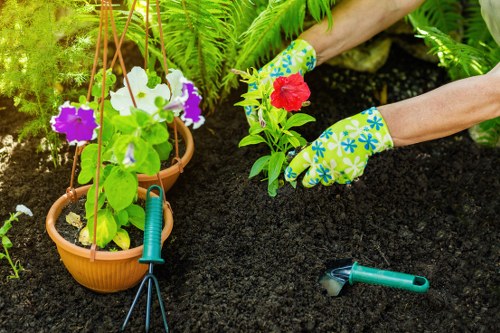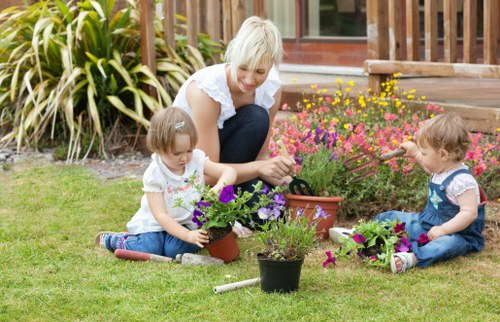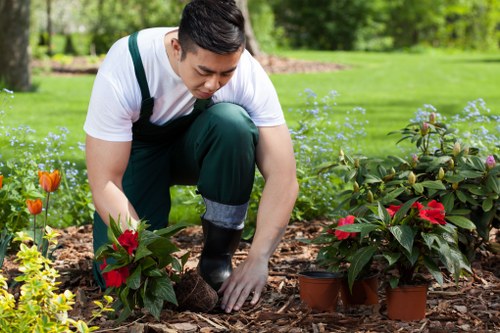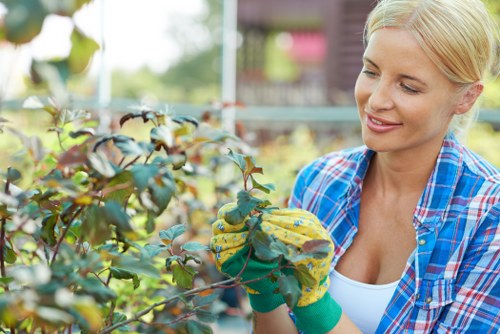Garden Maintenance in Keilor Park: Your Ultimate Guide to a Thriving Garden

Keilor Park is renowned for its lush greenery and vibrant community gardens. Maintaining a beautiful garden in this suburb not only enhances the aesthetic appeal of your home but also contributes to the local environment. Whether you're a seasoned gardener or a beginner, effective garden maintenance is essential for ensuring your plants thrive all year round.
In this comprehensive guide, we'll explore the best practices for garden maintenance in Keilor Park. From soil preparation to pest control, we've got you covered with tips and strategies tailored to the local climate and soil conditions. Let's dive into the key aspects of maintaining a healthy and beautiful garden.
One of the first steps in garden maintenance is understanding the specific requirements of your plants. Different plants have varying needs in terms of sunlight, water, and nutrients. By familiarizing yourself with these needs, you can create a tailored maintenance plan that ensures each plant in your garden receives the care it deserves.

Soil Preparation and Fertilization
Healthy soil is the foundation of a thriving garden. In Keilor Park, the soil typically has a good balance of nutrients, but regular testing and amending can significantly improve its quality.
Key Steps in Soil Preparation:
- **Soil Testing**: Conduct a soil test to determine pH levels and nutrient deficiencies.
- **Amending the Soil**: Add compost or organic matter to enhance soil structure and fertility.
- **Mulching**: Apply mulch to retain moisture, suppress weeds, and regulate soil temperature.
Regular fertilization is also crucial. Use a balanced fertilizer that provides essential nutrients like nitrogen, phosphorus, and potassium. Organic fertilizers are an excellent choice for environmentally-friendly gardening.
Pro Tip: Incorporate cover crops such as clover or alfalfa to naturally enrich the soil and prevent erosion.

Watering Practices
Proper watering is vital for plant health. Overwatering or underwatering can lead to a range of issues, including root rot and nutrient deficiencies.
Effective Watering Techniques:
- Deep Watering: Water deeply to encourage strong root growth.
- Early Morning: Watering in the early morning reduces evaporation and fungal growth.
- Drip Irrigation: Install drip irrigation systems for efficient water delivery directly to the roots.
Consider the local climate of Keilor Park when planning your watering schedule. During the hotter months, your garden may require more frequent watering, while in cooler periods, less water is needed.

Pruning and Trimming
Regular pruning and trimming are essential for maintaining the shape and health of your plants. Proper pruning promotes air circulation, reduces the risk of disease, and encourages new growth.
Best Practices for Pruning:
- Use Sharp Tools: Ensure your pruning tools are clean and sharp to make precise cuts.
- Prune at the Right Time: Different plants have optimal pruning times, usually in late winter or early spring.
- Remove Dead or Diseased Branches: This helps prevent the spread of pests and diseases.
For flowering plants, avoid heavy pruning during blooming periods to ensure you do not remove the buds and flowers.
Example: For rose bushes, deadhead regularly to promote continuous flowering.

Pest and Weed Control
Gardens are susceptible to various pests and weeds, which can hinder plant growth and reduce the overall beauty of your space. Implementing effective pest and weed control measures is crucial for a healthy garden.
Integrated Pest Management (IPM):
- Monitor Regularly: Keep an eye out for early signs of pest infestations.
- Use Natural Predators: Encourage beneficial insects like ladybugs and lacewings to control pest populations.
- Apply Organic Pesticides: When necessary, use eco-friendly pesticides to minimize environmental impact.
For weed control, consider mulching and manual weeding as primary methods. Avoid chemical herbicides that can harm your plants and soil health.
Tip: Implementing a dense planting strategy can naturally suppress weed growth by limiting the available space for weeds to establish.

Seasonal Garden Maintenance
Keilor Park experiences distinct seasons, each bringing its own set of gardening challenges and opportunities. Adapting your maintenance routine to the seasons ensures that your garden remains vibrant throughout the year.
Spring:
- **Plant New Seeds and Plants**: Take advantage of the warmer weather to introduce new flora.
- **Prepare Beds**: Clear debris and enrich the soil with compost.
Summer:
- **Consistent Watering**: Maintain a regular watering schedule to combat heat stress.
- **Pest Control**: Be vigilant in monitoring and managing pest populations.
Autumn:
- **Leaf Removal**: Keep your garden tidy by regularly removing fallen leaves.
- **Plant Bulbs**: Prepare for spring blooms by planting bulbs in the fall.
Winter:
- **Protect Plants**: Use frost covers to shield sensitive plants from cold temperatures.
- **Plan for Next Year**: Reflect on the past season and plan improvements for the future.
By tailoring your maintenance tasks to each season, you can address specific needs and ensure the longevity and beauty of your garden.

Tools and Equipment for Effective Maintenance
Having the right tools can make garden maintenance more manageable and efficient. Investing in quality equipment ensures that you can perform tasks effectively and with ease.
Essential Gardening Tools:
- Hand Trowel: Perfect for planting, transplanting, and potting.
- Pruning Shears: Essential for trimming and shaping plants.
- Garden Gloves: Protect your hands from dirt, thorns, and potential injuries.
- Watering Can or Hose: Necessary for providing adequate hydration to your plants.
- Wheelbarrow: Helpful for transporting soil, plants, and debris.
Additional tools like a lawn mower, hedge trimmers, and a compost bin can further enhance your maintenance routine, making tasks more efficient and effective.
Maintenance Tip: Regularly clean and sharpen your tools to extend their lifespan and ensure they work optimally.

Local Climate Considerations
Understanding the local climate of Keilor Park is crucial for effective garden maintenance. The area experiences a temperate climate with mild summers and cool winters, which influences plant selection and care strategies.
- Temperature: Average temperatures range from 10°C in winter to 25°C in summer.
- Rainfall: Keilor Park receives moderate rainfall throughout the year, with peak periods in spring and autumn.
- Sunlight: Gardens receive ample sunlight, but some areas may benefit from partial shade during the hottest months.
These climate factors impact watering schedules, plant choices, and protection measures. Selecting native or climate-adapted plants can reduce maintenance needs and improve garden resilience.

Choosing the Right Plants
Selecting suitable plants is a fundamental aspect of garden maintenance. In Keilor Park, opting for native or well-adapted species ensures better growth and less-intensive care.
Popular Plant Choices:
- Eucalyptus: A resilient tree that provides shade and a pleasant aroma.
- Lavender: Adds color and attracts pollinators while being drought-tolerant.
- Roses: Classic and versatile, suitable for various garden styles.
- Hostas: Ideal for shady areas, offering lush foliage and low maintenance.
- Geraniums: Bright and vibrant flowers that thrive in sunny spots.
Incorporating a mix of perennials and annuals can provide year-round interest and adaptability to changing conditions.
Pro Tip: Combine plants with varying heights and bloom times to create a dynamic and visually appealing garden landscape.

Lawn Care and Maintenance
A well-maintained lawn enhances the overall look of your garden and provides a green space for relaxation and activities. Proper lawn care involves a combination of mowing, fertilizing, and pest management.
Essential Lawn Care Tips:
- Mowing: Keep your grass at an optimal height, typically around 5cm, to encourage healthy growth.
- Fertilizing: Apply a balanced fertilizer in the spring and autumn to supply necessary nutrients.
- Watering: Water deeply but infrequently to promote deep root systems.
- Weed Control: Regularly remove weeds to prevent competition for resources.
Additionally, aerating your lawn annually helps improve soil structure and nutrient penetration.
Maintenance Suggestion: Consider overseeding bare patches to maintain a dense and lush lawn.

Garden Design and Layout
A thoughtful garden design enhances functionality and visual appeal. Planning your garden layout involves considering plant placement, pathways, and focal points.
Design Principles:
- Balance: Distribute plants and elements evenly to create a harmonious look.
- Contrast: Use varying colors, textures, and plant heights to add interest.
- Focal Points: Incorporate features like fountains, sculptures, or a beautiful plant to draw attention.
- Pathways: Design pathways to guide movement and connect different garden areas.
- Zones: Create distinct zones for different activities, such as dining, relaxation, or play areas.
Effective garden design not only makes your garden aesthetically pleasing but also simplifies maintenance tasks by organizing plants and features logically.

Sustainable Gardening Practices
Embracing sustainable gardening practices benefits both your garden and the environment. Sustainable methods promote resource conservation and reduce the ecological footprint of your gardening activities.
Eco-Friendly Techniques:
- Composting: Recycle organic waste into nutrient-rich compost for your plants.
- Rainwater Harvesting: Collect and use rainwater for irrigation to conserve water resources.
- Natural Pest Control: Utilize biological controls and organic treatments instead of chemical pesticides.
- Native Plants: Plant native species that require less water and are more resistant to local pests.
Implementing these practices not only fosters a healthier garden ecosystem but also contributes to broader environmental sustainability efforts.
Green Tip: Reduce plastic use by opting for biodegradable pots and tools made from sustainable materials.

Local Expert Tips for Keilor Park Gardeners
Gardening in Keilor Park comes with its unique set of challenges and opportunities. Leveraging local expertise can significantly enhance your garden maintenance efforts.
Top Tips from Local Gardeners:
- Adapt to Microclimates: Utilize sheltered areas for more delicate plants and expose sun-loving varieties to sunnier spots.
- Seasonal Planting: Choose planting times that align with Keilor Park's climate to maximize growth and bloom periods.
- Community Resources: Engage with local gardening clubs and attend workshops to stay informed about best practices.
- Wildlife-Friendly Gardens: Incorporate plants that attract native birds and beneficial insects to support local biodiversity.
By integrating these local insights, you can create a garden that not only thrives but also harmonizes with the Keilor Park environment.

10-15 Closest Areas to Keilor Park for Gardening Services
Keilor Park is surrounded by several suburbs that share a passion for gardening and offer excellent services to support your garden maintenance needs. Here are the closest areas you might consider when seeking professional help or joining a gardening community:
- Keilor Downs: Just a short distance away, offering specialized garden care services.
- Strathmore: Known for its vibrant community gardens and plant nurseries.
- Kings Park: Features extensive green spaces and expert landscaping services.
- Airport West: Provides a range of horticultural services catering to diverse garden styles.
- Gardens: Offers unique plant varieties and sustainable gardening solutions.
- Westmeadows: Home to several garden centers and professional gardeners.
- Maribyrnong: Known for its innovative garden designs and maintenance expertise.
- Essendon West: Features a mix of residential and commercial gardening services.
- Ascot Vale: Offers boutique gardening services and bespoke garden designs.
- Braybrook: Known for its community-driven gardening projects and support networks.
- Strathmore Heights: Provides comprehensive garden maintenance packages and consultations.
- Highvale: Offers eco-friendly gardening services and native plant specialists.
- Mapleton: Features a variety of gardening resources and professional landscapers.
- Glenroy: Known for its extensive range of gardening supplies and services.
- Avondale Heights: Provides personalized garden care and innovative landscaping solutions.
Each of these areas brings something unique to the table, ensuring you have access to top-notch garden maintenance services no matter where you are in the vicinity of Keilor Park.
Explore Your Options: Reach out to local gardening experts in these areas to find the best fit for your garden's needs.

Conclusion: Enjoy a Beautiful Garden All Year Round
Maintaining a garden in Keilor Park requires dedication, knowledge, and the right strategies. By following the tips outlined in this guide, you can ensure your garden remains healthy, vibrant, and a source of pride for your home.
Remember to adapt your maintenance practices to the local climate, choose appropriate plants, and utilize sustainable methods to create a garden that not only looks stunning but also supports the local ecosystem.
Ready to transform your garden?
Contact us today to learn more about our professional garden maintenance services in Keilor Park. Let our experts help you achieve the garden of your dreams!
